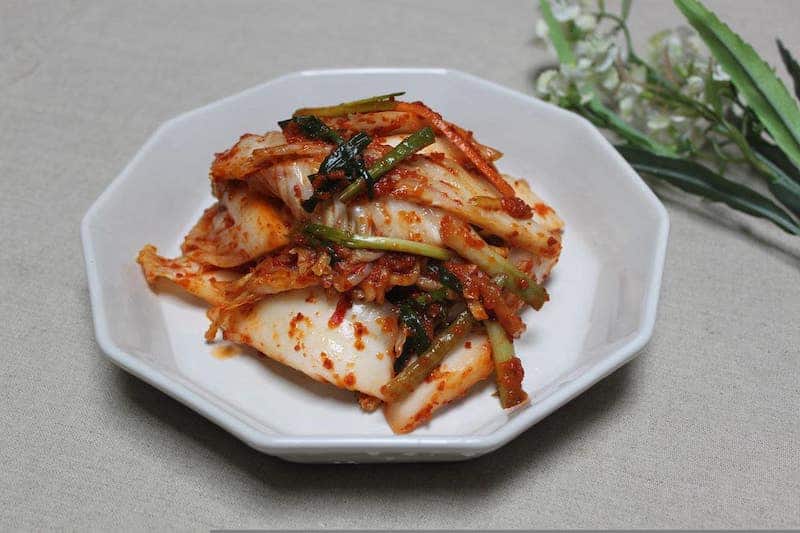Is Kimchi Halal?
As we know, kimchi gets its intense flavors because it’s fermented. As the fermentation process involves the production of alcohol, it’s not uncommon to ask – is kimchi halal?
Yes, Kimchi is indeed halal. Due to the tiny amounts of alcohol released during fermenting, you won’t feel the effects of it when you eat kimchi.
As a result, eating kimchi is permissible for Muslims. Keep reading to learn more.
Does Kimchi Contain Alcohol?
Because alcohol is a consequence of fermentation, it technically does, although the alcohol content is extremely low.
Fermented vegetables, mainly fermented cabbage, are used to make kimchi. Many helpful microorganisms arise during the fermentation process, including lactic acid bacteria.
Alcohol is produced as a byproduct of various fermentation processes.
Lactic acid is the primary byproduct of the kimchi-making process. Lactic acid bacteria aid in converting carbohydrates and sugars into lactic acid.
As kimchi ferments, it can produce ethanol as a by-product.
However, it’s only found in trace levels, most of which evaporate or ferment into vinegar. A small amount of alcohol can be found in typical kimchi.
There are vegan and halal options for the traditional version of kimchi (following Islamic dietary laws). However, due to many variations in kimchi, not all of them are vegan or halal by definition.
Seafood, shrimp, fish sauce, and so on are all used in certain variations.
The amount of alcohol in your kimchi will also vary according to the type you make.
If your kimchi smells sour or alcoholic, it may be past its prime and should be thrown out. To find out more about kimchi and its alcohol content, check out my article here.
Is Kimchi Halal or Haram?
If there’s no proof in the Qur’an or sunnah that indicates a meal is haram and should not be consumed, it’s generally considered halal (and therefore allowed) in Islam.
Pork is an example of haram food.
There’s no direct proof in the Qur’an or any hadith identifying kimchi as haram. Hence it’s considered halal.
According to Shaykh Ibn ‘Uthaymeen’s fatwa, a modest amount of intoxicating alcohol is permissible.
Islamic scholars have established that the fermentation of food is permissible.
However, according to an online fatwa, even if a small amount of alcohol is used to create a non-intoxicant, it is still considered pure and halal.
We can conclude that kimchi is allowed to eat because it has been approved as halal.
FAQ
Are Kimchi Noodles Halal?
Most brands of kimchi noodles are halal.
Adding kimchi and a spicy Korean sauce to plain stir-fried noodles transforms the dish into something special. But since kimchi is halal, kimchi noodles are as well.
Brands usually put on the package that the noodles are halal.
For example, a famous kimchi noodles brand, Nongshim Kimchi Ramyun Ramen Noodles, is certified halal.
If you’re not sure about a specific brand, look at the back of the package.
Is Kimchi Ramyun Halal?
Yes, and the same rule goes for kimchi noodles. Always check on the package if the kimchi ramyun is halal.
After being implicated in an Indonesian swine-related ramen incident earlier this year, South Korean instant noodle maker Samyang claims that its products have now been certified halal and are safe for consumption by Muslims.
The Korean Muslim Federation Halal Committee has recognized Samyang’s instant noodles as halal.
Halal-certified products bear the Korea Muslim Federation seal on their packaging, produced in specific production lines within a particular plant.
In 2011 halal certification was granted to Shin Ramyun from Nongshim as well.
In Summary
There are several kimchi recipes out there, and none of them call for alcohol. During fermentation, however, a tiny amount of alcohol is produced.
Kimchi can be eaten as long as the amount consumed is minor enough to not have the same effect on the body as conventional alcohol; therefore, it can be regarded as permissible.
However, if eating kimchi is still a concern, fresh kimchi is an option. As it isn’t fermented, it contains zero alcohol (though in my opinion, doesn’t taste as good as regular, fermented kimchi).







